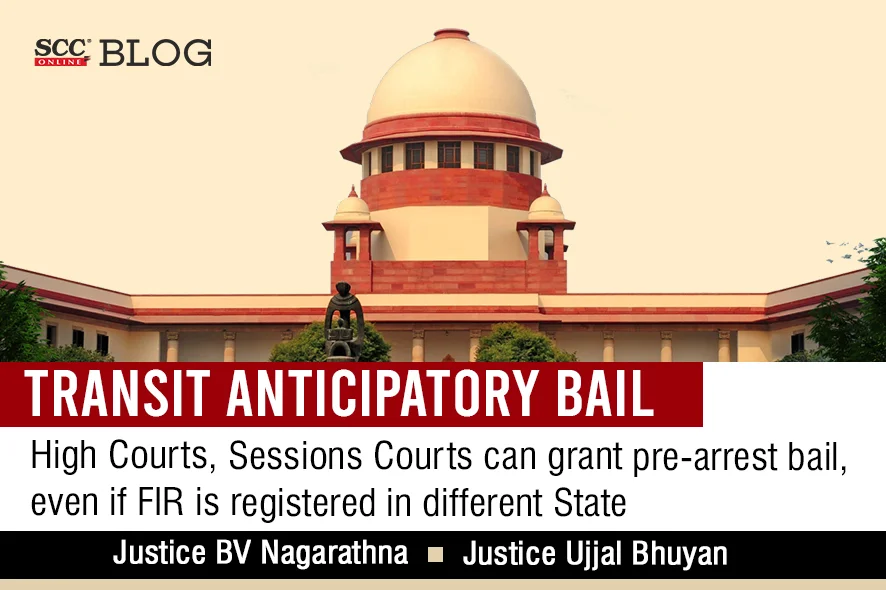Supreme Court: In a special leave petition filed by the wife against the Judgment passed by the Sessions Judge, Bangalore, wherein the Court has allowed the extraterritorial bail application by the accused/ husband, the division bench of BV Nagarathna and Ujjal Bhuyan, JJ. has held that that High Courts and Sessions Courts can grant anticipatory bail to an accused, even if the First Information Report (FIR) is registered in another State.
In this case, the wife had lodged an FIR in Rajasthan, but the husband was granted anticipatory bail by a Bengaluru Court.
Issues:
-
Whether the power of the High Court /Sessions Court to grant anticipatory under Section 438 of Code of Criminal Procedure, 1973 (‘CrPC’) be exercised with respect to an FIR registered outside the territorial jurisdiction of the said Court?
-
Whether the practice of granting transit anticipatory bail or interim protection to enable an applicant under Section 438 CrPC before a court of competent jurisdiction is consistent with the administration of criminal justice?
The Bench, while considering the constitutional imperative of protecting citizen’s right to life, and personal liberty, viewed that the High Court or Session Court should grant limited anticipatory bail in the form of interim protection under Section 438 of CrPC in the interest of justice, with respect to FIR registered outside the territorial jurisdiction
The Court laid down few conditions for grant of transit anticipatory bail:
-
The Investigating Officer (IO) and the Public Prosecutor should be given notice on the first date of such protection.
-
The order of grant must record reasons as to why the applicant apprehends an inter-state arrest and the impact of interim anticipatory bail as the as the case may be on the status of investigation.
-
The jurisdiction in which the cognizance of the offense has been taken does not exclude the said offense from the scope of anticipatory bail by way of a state amendment to Section 438 CrPC.
-
The applicant must satisfy the Court with his inability to approach the jurisdictional Court.
-
The grounds raised by the applicant may be reasonable and immediate threat to life, personal liberty, and bodily harm, the jurisdiction where FIR is registered, the apprehension of violation of the right to life or liberty or impediments owing to arbitrariness, the medical status or disability of person seeking extra-territorial limited anticipatory bail.
However, the Court reiterated that such power should be granted in exceptional and compelling circumstances only, which means that denying transit bail or interim protection to enable the applicant to make an application under Section 438 would cause irremediable and irreversible prejudice to the applicant.
Further, the Court to prevent the abuse process of a Court by the accused, said that it is necessary for the Court to ascertain the territorial connection/proximity between accused and the territorial jurisdiction of Court which is approached for such a relief. Such a link with territorial jurisdiction could be by way of place of residence or occupation, work or profession.
Also Read:
Transit Bail — Statutory Right or Judicial Innovation?
What is Transit Anticipatory Bail? Allahabad High Court explains
Source: Press








